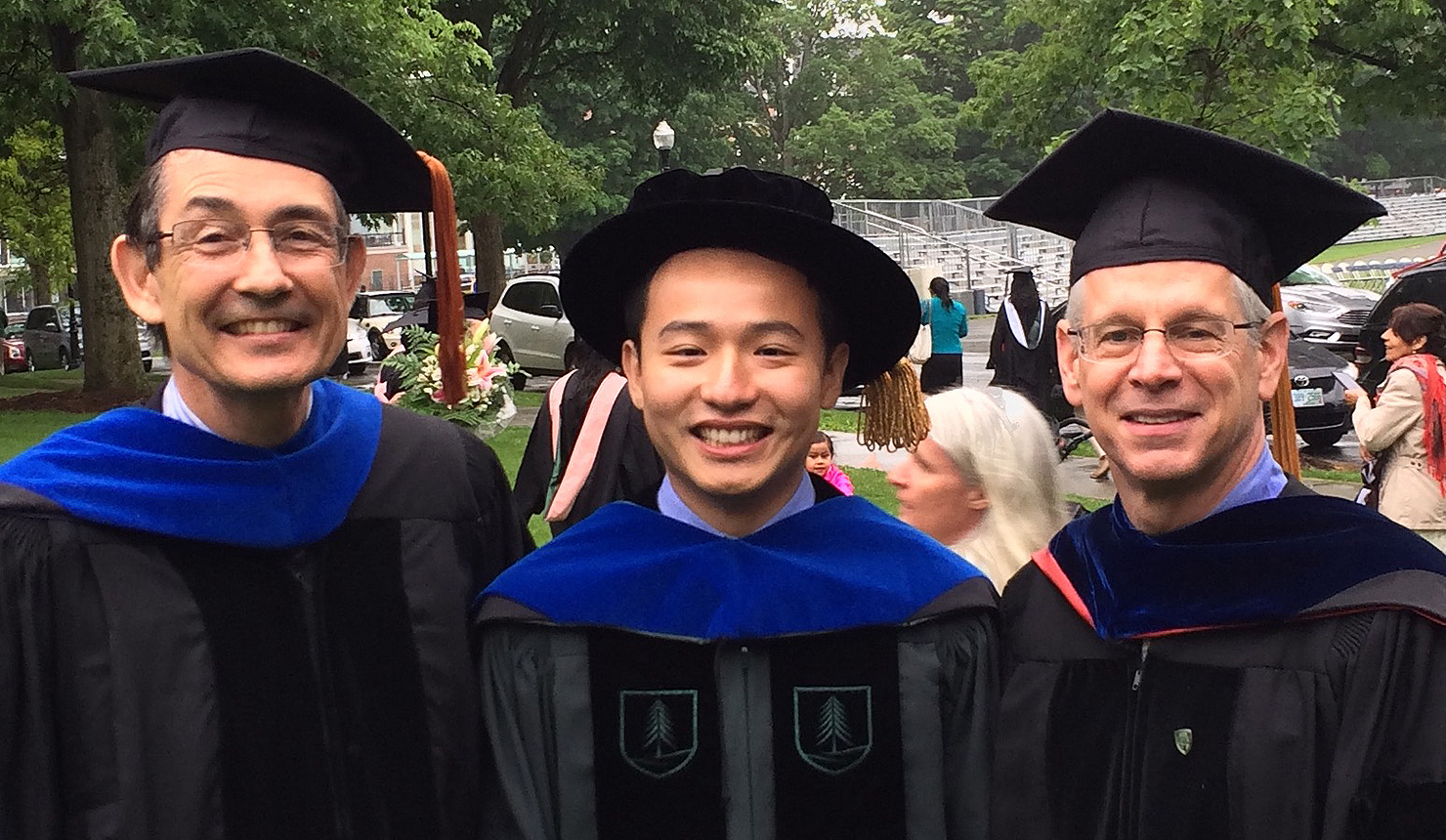Read article – Cites a paper authored by researchers at the Geisel School of Medicine that found within only six months to a year after beginning intravenous drug use, 50 to 80 percent of drug users test positive for the hepatitis C antibody.
Articles by: Geisel Communications
BMDS’s David Qian Receives Biomedical Research Award
Biomedical Data Science (BMDS) graduate student David Qian was awarded the prestigous John W. Strohbehn Medal for Excellence in Biomedical Research at the Dartmouth College’s Graduate Investiture Ceremony.
What Are the Odds That Your Medication Will Help You Get Better? – STAT News
Read article – Quotes H. Gilbert Welch, professor of medicine, community and family medicine, and of the Dartmouth Institute for Health Policy and Clinical Practice, in an article that examines if drugs and other treatments are likely to help patients get better. “People at higher risk of an adverse outcome tend to benefit more [from an intervention], so the NNT [number needed to treat] is always lower” than in lower-risk people, says Welch.
Health Affairs Web First: New Methodology To Examine Spending Patterns For End-Of-Life Care – Health Affairs Blog
Read article – Features a new study co-authored by Julie Bynum, associate professor of medicine and of The Dartmouth Institute for Health Policy and Clinical Practice, that looked at 2012 Medicare administrative claims data and identified four unique spending trajectories.
Antibiotics, Formula Feeding Might Change Baby’s ‘Microbiome’ – U.S. News & World Report via HealthDay
Read article – Quotes Anne Hoen, assistant professor of epidemiology, biomedical data science, and microbiology and immunology, about how microbiomes evolved with humans and are mostly helpful, but that there’s still a lot of mystery about how they work. “There is a lot left to discover about how subtle variations in the makeup of these communities might be more or less optimal for health and, importantly, how we can manipulate them so they’re most beneficial to us,” says Hoen.
Doctor’s Plan for Full-Body Transplants Raises Doubts Even in Daring China – The New York Times
Read article – Quotes James Bernat, the Louis and Ruth Frank Professor of Neuroscience and professor of neurology and medicine, on orthopedic surgeon Dr. Ren Xiaoping’s plans to carry out full-body transplants in China, raising concerns among medical experts and ethicists around the world. “For most people, it’s at best premature and at worst reckless,” says Bernat.
The Racial Pay Gap Extends Even to Doctors – The Washington Post
Read article – William Weeks, professor of psychiatry, community and family medicine, and of the Dartmouth Institute for Health Policy and Clinical Practice, is quoted about how a new study that found there is a large salary gap between white male doctors and everyone else has a major flaw: a significant part of the data the finding depends on didn’t identify whether the doctors were primary care doctors or specialists. Weeks, a health economist and physician, roundly dismissed the study’s findings for that reason. His research has found no evidence of a racial pay gap among doctors. “This is really not good research,” says Weeks. “The key question is, do women or black or minority [doctors] have access—can they get into these higher-paid sub-specialties? … That’s a really different question and a really important one.”
Race, Gender May Affect U.S. Doctor Paychecks – Philly.com via Reuters
Read article – Quotes William Weeks, professor of psychiatry, community and family medicine, and of the Dartmouth Institute for Health Policy and Clinical Practice, about a new study that examines the correlation between race and gender, and how much physicians are paid. “The real issue that’s driving their results is that there are many more white specialists than black specialists, and specialists make a lot more money than primary care physicians,” says Weeks.
Dennis McCullough, Pioneer of ‘Slow Medicine’ in End-of-Life Care, Dies at 72 – The New York Times
Read article – Dennis McCullough, honorary associate professor of community and family medicine and pioneer of the “slow medicine” movement, which advocates palliative care over invasive regimens for older patients suffering from the inevitable and irreversible decline of aging, died last Friday in Bar Harbor, Me. He was 72.
Researchers: Mentally Ill Can Be Helped With Employment Support – New Hampshire Union Leader
Read article – Quotes Gary R. Bond, professor of psychiatry and author of a recent study that found most people with serious mental illnesses can improve the quality of their lives when they have outside support to find and keep a job, but most states lack the funding for those type of resources.
